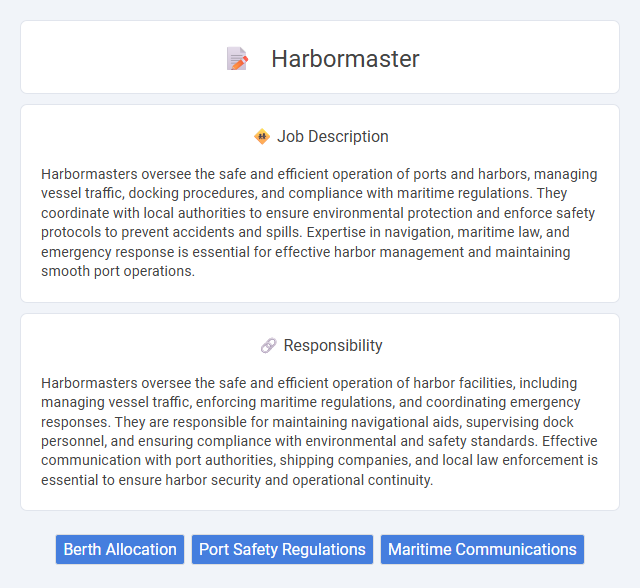
Harbormasters oversee the safe and efficient operation of ports and harbors, managing vessel traffic, docking procedures, and compliance with maritime regulations. They coordinate with local authorities to ensure environmental protection and enforce safety protocols to prevent accidents and spills. Expertise in navigation, maritime law, and emergency response is essential for effective harbor management and maintaining smooth port operations.
Individuals with strong leadership skills and the ability to remain calm under pressure may be well-suited for a harbormaster position, as the job often requires managing complex logistical operations and ensuring maritime safety. Those who have physical stamina and are comfortable working outdoors in various weather conditions might find the role more manageable and fulfilling. Conversely, people who prefer sedentary office work or have difficulty handling stressful situations may find this profession less suitable for their capabilities and preferences.
Qualification
Harbormasters typically require a high school diploma or equivalent, with many positions preferring candidates holding advanced certifications such as a captain's license or maritime safety training. Experience in marine vessel operations, navigation, and coastal regulations is crucial, often supported by backgrounds in law enforcement or public administration. Strong leadership, emergency response skills, and knowledge of environmental compliance enhance eligibility for this role.
Responsibility
Harbormasters oversee the safe and efficient operation of harbor facilities, including managing vessel traffic, enforcing maritime regulations, and coordinating emergency responses. They are responsible for maintaining navigational aids, supervising dock personnel, and ensuring compliance with environmental and safety standards. Effective communication with port authorities, shipping companies, and local law enforcement is essential to ensure harbor security and operational continuity.
Benefit
Harbormaster positions likely offer competitive benefits such as health insurance, retirement plans, and paid leave, enhancing job security and overall well-being. Access to professional development opportunities and certifications may be probable, supporting career growth. The role often provides the advantage of working outdoors and engaging with maritime communities, which could improve job satisfaction and work-life balance.
Challenge
Working as a harbormaster likely presents significant challenges in coordinating vessel traffic and ensuring safety within a busy port environment. Managing emergencies and maintaining compliance with maritime regulations could frequently demand quick decision-making and strong leadership skills. The dynamic nature of weather conditions and operational logistics probably adds complexity to daily responsibilities.
Career Advancement
A Harbormaster oversees port operations, ensuring safety, security, and efficient vessel traffic management. Career advancement opportunities include moving into senior maritime management roles, such as Port Director or Maritime Operations Manager, where strategic planning and regulatory compliance are prioritized. Gaining certifications like the Certified Port Executive (CPE) and experience in logistics or maritime law significantly enhance promotion prospects.
Key Terms
Berth Allocation
Harbormasters oversee berth allocation to optimize dock space utilization and accommodate vessel schedules efficiently. They analyze vessel size, draft, and arrival times to assign appropriate mooring spots while ensuring safety and regulatory compliance. Effective berth allocation minimizes turnaround time, enhances port throughput, and supports seamless maritime operations.
Port Safety Regulations
Harbormasters enforce strict port safety regulations to ensure secure navigation and protect maritime assets. Their responsibilities include overseeing vessel movements, monitoring compliance with environmental laws, and coordinating emergency response efforts. Maintaining these regulations minimizes accidents, safeguards port infrastructure, and promotes efficient harbor operations.
Maritime Communications
Harbormasters manage critical maritime communications to ensure vessel coordination, safety, and regulatory compliance within harbor operations. They utilize advanced radio and digital communication systems to monitor ship traffic, relay navigational information, and respond to emergencies effectively. Mastery of maritime communication protocols and technology is essential for maintaining smooth harbor logistics and preventing accidents.
 kuljobs.com
kuljobs.com